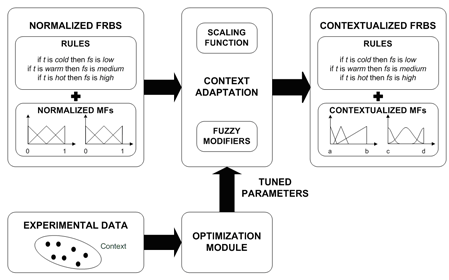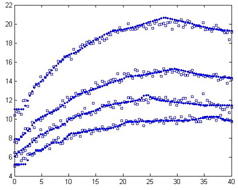Research
Context Adaptation of Fuzzy Systems
Bibliography on context adaptation of fuzzy systems
The idea of introducing the notion of context into fuzzy systems comes from the very simple observation that, in real life, the same basic concept can be perceived differently in different situations, depending on, e.g., the external environment, the observer, and so on. Human perceptions and decisions are highly influenced by context; therefore, as fuzzy logic aims to model human reasoning, it is straightforward to apply context in fuzzy systems.

A sample overall context adaptation process
In the literature, context adaptation in fuzzy systems has mainly been approached as scaling of fuzzy sets from one universe of discourse to another by means of non-linear scaling functions whose parameters are identified from data.
The idea of this project is to introduce a new context-aware approach to the automatic development of fuzzy systems from data. Coherently with previous works, we derive general and high-level rules that are context-independent and then we adapt a Fuzzy Rule-Based System (FRBS) to each context, modifying linguistic variables by appropriately defined scaling functions and fuzzy modifiers.
The main objectives of context adaptation are:
- reuse of existing fuzzy systems and domain knowledge;
- interpretability-oriented adaptation;
- high-level rule identification from data;
- identification of context variables.

Four different 2D curves representing context adaptation of the same fuzzy system
